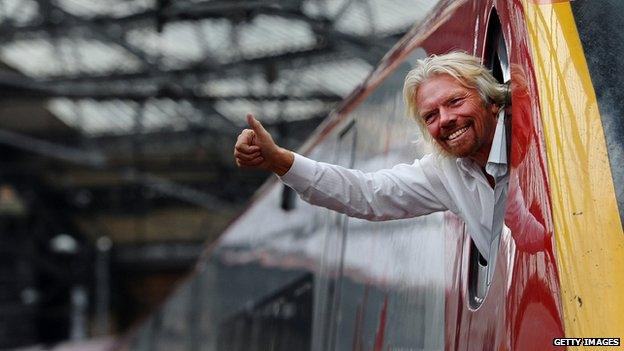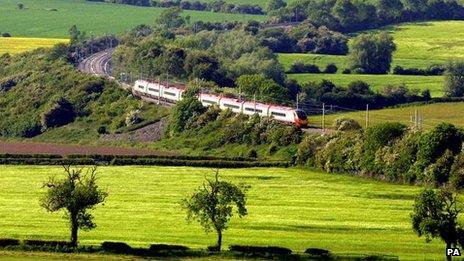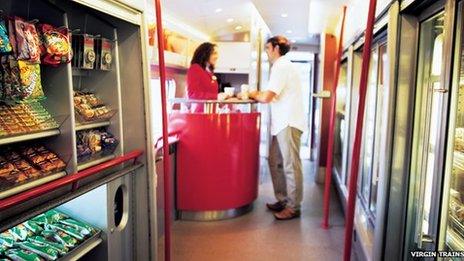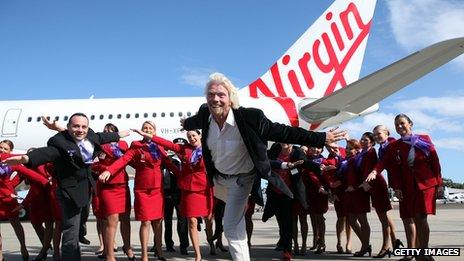Virgin West Coast trains: Will anyone be nostalgic?
- Published

Virgin Trains aimed to shake up the railway business when it took over the West Coast mainline. Now, having lost the franchise to FirstGroup, how will its service be remembered?
The train is somewhere outside Stoke.
You are doing your business in the cavernous disabled toilet when you hear a disconcerting rumble and look up to see the electronic door begin to slide open. Your trousers are round your ankles.
By the time you get up and cross to the door buttons on the other side of the room there are a couple of young women peering in wide-eyed.
You stand there, one hand on the close door button, the other protecting your modesty, trying to look normal. The onlookers' expressions turn from surprise to horror. The door begins to close but at a glacial pace.
You are rooted to the spot, waiting to press the lock button. Eventually the door closes. And outside the laughter erupts.
You complete your ablutions, take a deep breath and face the music. You make eye contact with the two women and attempt a joke about Richard Branson and lavatorial humour.
But the joke is on you. Your trousers might as well still be round your ankles. You retreat to your seat, which mercifully is several carriages away. Your blushes remain all the way to Manchester Piccadilly.
This is one particularly excruciating experience of Virgin Trains, whose electronic toilets' locking method often left users as red-faced as the company livery.
.jpg)
Like an aeroplane. Only not like an aeroplane
When Sir Richard Branson took over the West Coast mainline in 1997, he wanted to give trains an airline-style makeover. At every stage they tried to stamp their brash, red-squiggled identity on to the railway experience.
In the station there were space-age, scarlet ticket machines where the harassed passenger - already late - would have to enter a long reference number like RRXK583F using a hit-and-miss touch screen keypad.
The coloured zones on the platform - gold, purple, orange - were introduced to help passengers stand in the right place for their carriage. The practice is common on France's SNCF network. But it never really caught on in Britain and the idea appears to have fizzled out.
Virgin's West Coast operation will be most remembered for their sleek, new Pendolino trains. They seemed faster. But the track limited their top speed for much of their service.
Using the euphemisms of an estate agent, the train interiors are "cosy" and "compact" with a "snug" vestibule. In other words, narrow carriages, low ceilings, cramped seats with tiny windows, and luggage racks with room for a couple of bags.
The toilets smell, notes rail expert Christian Wolmar. And a faint whiff of sewage always seemed to mysteriously fill the vestibules.
When Virgin got into trains they had a reputation for excellent customer service on their airline, says Matthew Engel, author of Eleven Minutes Late.

A lot of this was down to detail, like serving choc ices after the in-flight movie. There were rumours that they would bring in massages for their train passengers.
In the end there were no choc ices or massages. But you got an in-flight magazine. It was all a bit disappointing for a revolutionary new train.
"I remember Richard Branson saying he wanted to create trains like aeroplanes," says Philip Haigh, business editor of Rail magazine. "Sadly he succeeded."
To some the seating areas seemed claustrophobic, while the toilets were vast. On a busy train, Haigh remembers seeing an entire family sitting in one of the disabled toilets.
Then there are the mysterious beeps that go off just as the traveller was being lulled into a blissful sleep.
The series of shrill chimes sound like an announcement is coming. You brace yourself for news of a delay or the arrival at your next "station stop". But nothing happens, leaving you so annoyed you are unable to get back to sleep.
The mystery surrounding the noise has occupied train enthusiasts on message boards, external. A wrongly activated alarm in the disabled toilet is the most regularly cited explanation.
It was not all negatives. There were heavily discounted tickets for those willing to book weeks ahead and travel outside rush hour.
Virgin was the first train provider to open a shop, says Haigh. This was a real innovation. Suddenly you could go in and choose what you wanted, rather than have to ask. Magazines and newspapers were on sale.
Virgin's breakfasts have developed a loyal following, offering a fresh fruit platter, smoked salmon and scrambled egg, breakfast grill or vegetarian grill.

Bacon roll, anyone?
But not everyone has fond memories of the onboard hospitality. Engel recalls an unpleasant encounter in a Virgin shop.
He was at the counter pondering what to order when the steward addressed him using the most offensive word in the English language and urged him to choose a bacon roll. When he thought he'd misheard, the steward encouraged him to hurry up, this time using another piece of choice industrial language.
"I named the steward in my book. It was the most talked-about thing in it. The odd thing was I never heard a solitary word from Virgin's many PR people, which suggests he was bang to rights."
And announcements for the shop - an interminable list involving cold drinks, tea, coffee, hot chocolate, alcoholic beverages, toasted sandwiches, hot bacon rolls - seemed to be more long-winded than the other train companies.
The Quiet Zone - not a feature unique to Virgin - can be relied on to be full of noisy families and self-important salesmen on their mobile phones repeating "Janice, I'm losing you. Are you there?" as the train enters another tunnel.
Perhaps Virgin was no more guilty than its competitors for these problems. It wasn't necessarily the first to introduce the jarring phrase "station stop" or to provide obfuscatory explanations for delays. But it fitted the image. It had become a symbol for the new, heavily branded corporate railway.
Part of the problem was that the franchise got off to a "dreadful" start, says Engel. In the public mind it became associated with delays, cramped trains and high fares.
A single to Manchester could cost as much as £140. In TV comedy The Thick of It, "Virgin West Coast" was used as a term of abuse to shut someone up.

Richard Branson was arguably the world's best-known train boss
Virgin had its own reasons for being angry. The Pendolino trains were capable of 140mph but for much of their service have been limited to much lower speeds, with the blame heaped on government U-turns on upgrading the track.
Perhaps because of these problems, the company developed an aggressive PR strategy, the rail pundits note. The message the legion of PRs pumped out of the "iconic" Virgin experience wasn't always the full story, says Wolmar.
It sought to take the credit for bringing in the new trains. But these were in the contract set by the government.
Virgin's legacy divides commentators.
Customer satisfaction levels are now running at an impressive 91%, in contrast to new franchise owner FirstGroup's 83%. It has increased passenger numbers by 10% a year recently.
And the average price paid for a ticket on the West Coast line has actually fallen in the last decade due to the range of discounts available, according to Mark Smith who operates the Man in Seat Sixty-One blog.
For all its problems, it has helped to modernise railways, says Haigh. "It has made a difference. It has shifted the railway from the staid public service-style organisation to one committed to passengers."